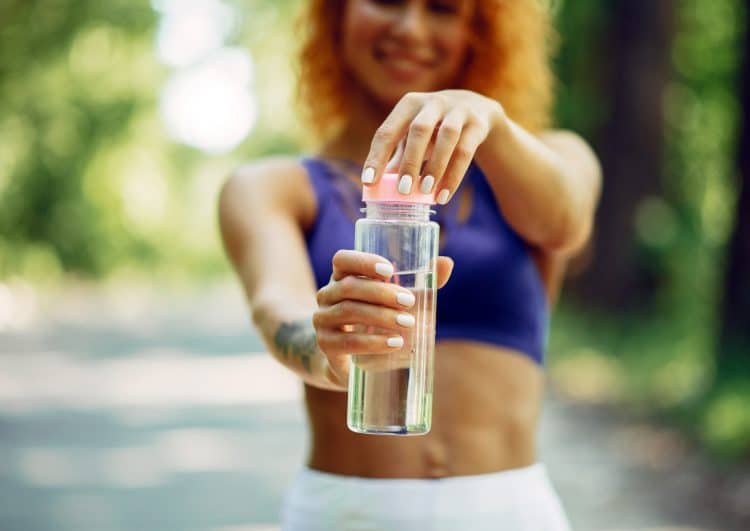If you are a fitness enthusiast seeking to take appropriate steps to enhance your water fasting (WF) practice, this article can help you take the right path.
Much like intermittent fasting, water fasting has gained considerable attention in the world of health and wellness.
Water fasting involves restricting all kinds of food and beverages except water while fasting. It can help lose weight and is beneficial in reducing risks associated with chronic health conditions.
Calculate Your Autophagy Timeline
Find out exactly when your body enters autophagy based on your unique profile, diet, and fasting protocol.
Calculate My Autophagy Window →I have followed various intermittent fasting methods for several years, and I water fast periodically. As a healthcare professional, I can vouch that WF has incredible health benefits when done correctly. Overdoing water fasting or not following the recommended ways can cause more harm than good.
Before adopting any fasting method, it is crucial to understand how it works, weigh the pros and cons, and check whether it suits your lifestyle and fitness needs. Hence, this is an attempt to guide the readers to what you can expect from water fasting through its various stages.
Here’s what this article will discuss:
- What is water fasting, and its benefits?
- Different stages of water fasting
- How do you optimize water fasting?
- Water fasting FAQs
If you want to try water fasting, check out this comprehensive guide to make the best of your fasting.
What is Water Fasting?
Water fasting (WF) involves consuming only water for the duration of your fast. Yes, you read that right! This fasting practice focuses on restricting food completely for the fasting duration. Water fasts usually last for 24 hours to 72 hours.
But why do people water fast? While there are varied reasons, here are a few common ones.
- Religious or spiritual reasons
- Lose weight
- Detoxification
Preparing for a medical procedure may also require you to water fast for a particular duration.
What Benefits to Expect from Water Fasting?
Consuming food or beverages adds calories to your body. Restricting the intake of calories for a certain period while water fasting offers several health benefits, including a lower risk of cardiometabolic disease. (1)
Some studies indicate that fasting with water can enhance autophagy. For readers new to the concept, autophagy is a natural process by which your damaged and dysfunctional cell components are broken down to be repurposed or discarded. As autophagy plays a significant role in preventing aging, going without food for a particular period may slow aging. (2)
The lemon detox diet, where you’re only allowed to consume lemon water, is inspired by water fasting. While water fasting can help detoxify your body, prolonged fasts with no food could negatively affect your health.
To further understand the best way to approach water fasting, let’s see the different stages of water fasting.
Try our Water Fasting weight loss calculator.
Different Stages of Water Fasting
Preparing a little before beginning water fasting can be beneficial. Here’s how you can prep your body for a water fast:
Prepare your body at least 36 to 48 hours before embarking on the water-only fast. In this phase, introduce shorter fasting durations to let your body adapt to the new fasting routine. For instance, you can reduce energy-intensive food and eat lighter meals with fruits and vegetables.
Simultaneously, consider cutting down on processed and refined food in the prep period as it will help your body resist cravings to some extent and help prepare for the longer duration of water fast. (3)
Once you’ve aced this phase, the following step would be to plunge into your water fasting plan. Here’s how you can organize the fast and what happens at each stage.
Stage 1: Water Fasting for 12 Hours
In the initial 12 hours of fasting, there’s a gradual transition phase where you might not observe any significant metabolic changes. That’s because your body might be carrying calories from your previous meals that you’ve had before beginning the fast.
Only after 12 hours of fasting does your body gradually begin to run out of glycogen stored in the liver. It is followed by the liver breaking down stored fatty acids called ketones. The ketone level is typically low in a fed state but rises during fasting, particularly between 8 to 12 hours. (4)
Glycogen is a stored carbohydrate used by the muscles as a fuel source during high-intensity workouts. Once the glycogen levels deplete, the body shifts into a fasting ketosis state. This process breaks down and oxidizes fat to release energy required by the body. However, this phase may kick off after 18-24 hours for most people.
Sometimes, at Stage 1 of water fasting, you may experience lethargy during your workouts. It happens because your body may not be used to burning fat for energy at a high level; it can leave you feeling tired during workouts and trigger food cravings.
Stage 2: Water Fasting for 18 hours
At stage 1 of water fasting, your body starts the onset of ketosis. However, it is not until 18 hours that most people enter the actual state of ketosis. In Stage 2, which extends to 18 hours, your body is most likely to burn fat to fulfill its fuel needs because glycogen stores are likely to be depleted at this stage.
According to studies, the average adult human body stores around 600 grams of glycogen. As each gram of glycogen can fuel about 4 calories, it is suggested that people have approximately 2,400 calories stored as energy. (5)
The glycogen content in the liver cells may not be the same throughout and can vary depending on the carbohydrates in your diet and the time between meals. Moreover, the intensity of exercise and the duration of your physical activity may also influence the level of glycogen found in your liver in a day. The muscle glycogen provides energy during your workout sessions.
At this stage of water fasting, as your body burns fat, it will also generate higher levels of ketones, where the latter serves as the primary fuel source for cells. Therefore, while you may encounter common fasting symptoms, some individuals might also enjoy additional benefits from ketone burning, such as enhanced mental clarity.
Also, towards the end of this water fasting stage, you will observe a drop in the water weight, which happens once the body’s glycogen has wholly exhausted. The body stores about 3 grams of water for every gram of glycogen.
As your body burns off all the glycogen and isn’t fueled with any carbohydrates during the water fast, your body will release the stored water. The weight loss you experience in this phase can be attributed to eliminating stored body water instead of actual fat loss.
Although your scale might show pleasing results, it’s important to remember that much of this weight loss is due to water loss from glycogen depletion. Hence, it is essential to replenish your body with water at this stage to prevent dehydration. You can use a water-fast weight loss calculator to track your progress through the journey.
Stage 3: Water Fasting for 24 Hours
At this stage, when your body is in a fasted state for 24 hours, the autophagy process begins. So, if you follow water fast for more than 24 hours, your body will begin the cell cleanup process. During this phase, the damaged, dysfunctional, and dead cell elements will be eliminated and repaired in the body to maintain overall cell health.
Autophagy is essential for safeguarding your body from neurodegenerative diseases, premature aging, and other forms of oxidative damage, inflammation, and other health problems. (6)
Most people at this stage of water fasting experience increased energy, while some may experience hunger, irritability, and lethargy. Make sure to drink plenty of water regardless of how tired or energetic you feel at this stage to keep dehydration at bay.
Stage 4: Water Fasting post 48 hours
Once your body completes more than 48 hours of water-only fasting, it will continue to be in ketosis and autophagy. However, the human growth hormone (HGH) will likely increase manifold at this stage.
Consider keeping yourself hydrated enough to compensate for the loss of electrolytes through urine and sweat. Moreover, remember that your body is also deprived of electrolytes sourced from food due to water-only fasting for 48 hours. Therefore, it would need to soak as much as possible from your water intake.
Stage 5: Water Fasting for More Than 60 Hours
As water fast can last until 72 hours, when you cross the 60-hour mark of relying solely on water, you might experience some notable changes. Approximately 60 hours after the fast, your body will undergo a drop in insulin levels. It will trigger cell sensitivity to insulin.
Individuals with health conditions, such as metabolic syndrome, insulin resistance, or even type 2 diabetes, may benefit from this stage of water fasting.
Stage 6: Water Fasting for More Than 72 Hours
Completing 72 hours of fasting marks the final stage of water fasting and is characterized by your body’s enhanced ability to strengthen the immune system. In this phase, your body begins to disintegrate damaged and dead immune cells and, in the process, produce new and healthier cells. Aside from heightened immunity, water fasting for 72 hours can also decrease inflammation.
How To Optimize Water Fasting?
Maximize the benefits of water fasting by focusing on post-fast regeneration. After three days of fasting, your digestive system will need simple, easily digestible food. Loading your body with heavy or calorie-intense foods may not be a good idea when breaking your water fast. You might want to binge eat after 72 hours of this no-food fast, but it could lead to an upset stomach.
Consider consuming light fruits or making smoothies to reintroduce solids into your system gradually.
FAQs
Does water fasting pose any risk?
While water fasting has certain health benefits, it may come with health risks. It could cause dehydration as some water is also sourced from food, which would be missing due to no food intake during fasting.
Dehydration from water fasting can cause a drop in your blood pressure levels and increase the risk of dizziness and fainting. It could worsen certain pre-existing health conditions. Hence, discussing this with your doctor before starting water fasting is best.
Will water fasting help me lose weight?
Yes, water fasting can help you lose weight. However, evaluate the health risks of prolonged water fasting before commencing it.
Is a three-day fast healthy?
The three-day/72-hour fast can be a powerful tool for weight loss, healing your system, and contributing to overall well-being. However, fasting must be cautiously approached, especially if you have pre-existing health conditions or are new to fasting. You can always start with a more beginner-friendly intermittent fast before trying the stringent water fasting.
Conclusion
Water fasting may work well for many, but some may find other IF options more suitable. It is essential to approach this fasting method cautiously instead of being too harsh on yourself. Ensure to drink plenty of water regularly throughout this fast, as that would be your body’s only nourishment. Also, don’t overindulge when breaking your fast.
I personally observed a decrease in my appetite compared to before I started water fasting. The fast can also reset your body’s idea of hunger.
As water fasts come with several risks, evaluating your existing medical condition or visiting a doctor before starting the water-only fast is ideal. If it is your first time fasting, try beginner-friendly methods such as intermittent fasting. These methods allow you to consume food during the eating windows, and you can better sustain them in the long term.
References
Fitness Volt is committed to providing our readers with science-based information. We use only credible and peer-reviewed sources to support the information we share in our articles.
- Scharf, E. et al. (2022) The effects of prolonged water-only fasting and refeeding on markers of cardiometabolic risk, Nutrients. Available at: https://www.ncbi.nlm.nih.gov/pmc/articles/PMC8951503/ (Accessed: 13 December 2023).
- Ogłodek, E. and Pilis Prof, W. (2021) Is water-only fasting safe?, Global advances in health and medicine. Available at: https://www.ncbi.nlm.nih.gov/pmc/articles/PMC8369953/ (Accessed: 13 December 2023).
- Anguah, K.O.-B. et al. (2019) Changes in food cravings and eating behavior after a dietary carbohydrate restriction intervention trial, Nutrients. Available at: https://www.ncbi.nlm.nih.gov/pmc/articles/PMC7019570/ (Accessed: 13 December 2023).
- Wang, Y. and Wu, R. (2022) The effect of fasting on human metabolism and psychological health, Disease markers. Available at: https://www.ncbi.nlm.nih.gov/pmc/articles/PMC8754590/#:~:text=A%20shift%20from%20preferential%20lipid,FFAs)%20to%20produce%20increased%20fatty (Accessed: 13 December 2023).
- Murray, B. and Rosenbloom, C. (2018) Fundamentals of glycogen metabolism for coaches and athletes, Nutrition reviews. Available at: https://www.ncbi.nlm.nih.gov/pmc/articles/PMC6019055/ (Accessed: 13 December 2023).
- Access NCBI through the World Wide Web (WWW). (1995, February). Molecular Biotechnology, 3(1), 75–75. https://doi.org/10.1007/bf02821338
Tip: If you're signed in to Google, tap Follow.













Dear Dr Byakodi,
I am grateful for your article. I have been on the IF regime of 18-20 vs 4-6 for about 3 years. My BMI is 24.2 and very stable.
I am planning to introduce a detox program. My current thinking is five consecutive days (Mon to Fri) once every two months, ie in the first week of an odd month. Next week will be my first attempt.
My plan is:
Mon – WF, 20 vs 4, on 100% plant-based, tofu and max 2-3 eggs.
Tues – WF, 24 hours
Wed – same as Mon
Thurs – WF, 24 hours
Fri – same as Mon & Wed.
I would appreciate your comments/advice on my plan.
Also, should I take electrolyte supplements with water? How can I tell when/if my body needs electrolyte supplements?
Thank you very much.
Hello Tran Tai,
Thank you for your interest in water fasting and sharing your plan. It’s great to see your dedication to health through intermittent fasting. Your plan of incorporating water fasting (WF) with a plant-based diet and occasional eggs seems thoughtfully balanced. Regarding electrolyte supplements, they can be beneficial during extended fasting to maintain electrolyte balance. Signs you might need them include fatigue, dizziness, or muscle cramps. However, it’s essential to listen to your body and consult with a healthcare professional, especially before starting a new detox regime. Your approach of integrating water fasting while maintaining a moderate BMI is promising, but remember, individual responses can vary.
Wishing you success in your health journey!